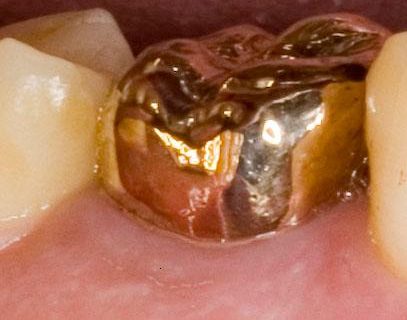Nowadays, gold alloy is used to construct dental crowns that will either be placed on top of titanium implants or placed on shaved down teeth that still have a healthy inner layer. Since they do not blend in nicely with natural teeth due to the colour difference, gold crowns are usually placed on molar teeth in order to hide them from plain sight.
Although gold in the mouth is considered a status symbol in some cultures, this is not the case in Canada. Despite the aesthetically displeasing properties of a gold crown, there are some major benefits to using gold for a prosthetic tooth, with some minor disadvantages.
Advantages of using gold dental crowns
 Strength & durability – because it is made primarily out of gold, usually with a mix of several other metals, gold crowns are stronger than their ceramic, porcelain or porcelain fused with metal counterparts. These
Strength & durability – because it is made primarily out of gold, usually with a mix of several other metals, gold crowns are stronger than their ceramic, porcelain or porcelain fused with metal counterparts. These
crowns are almost impossible to crack or chip making them last much longer than any other type of crown,
especially when replacing molars which take more impact than other teeth.- Superior bio compatibility – teeth made of gold wear down at a similar rate to tooth enamel. Porcelain, on the other hand, does not wear down at all making it abrasive toward opposing teeth causing damage to them over time.
- Hypoallergenic – only in extremely rare cases do people have an allergic reaction to contact with gold. This makes it a widely accepted material for dental implants.
- Best fit possible – when compared to other tooth restoration materials, gold is by far the easiest to mold due to its malleability. This makes it easy to make a perfectly fitting crown that will not put too much pressure on adjacent and opposing teeth.
Disadvantages of using gold dental crowns
When it comes to using gold as a tooth replacement option, the advantages greatly outweigh the disadvantages, especially from a practical stand point. In reality, the only significant disadvantage of having a gold tooth is the fact that it is not the same colour as a natural tooth and thus doesn’t blend in nicely.
In rare cases, there is also the small chance of having an allergic reaction to gold when placed in the mouth, but considering how rare this is it shouldn’t even be considered a viable risk.